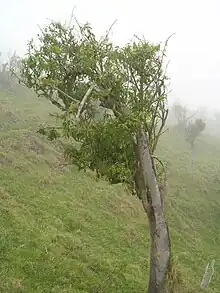Charpentiera
Charpentiera is a flowering plant genus in the family Amaranthaceae. It consists of five species endemic to Hawaiʻi, where they are known as pāpala, and one species found only on the island of Tubuai in the Austral Islands. All species are trees, some reaching more than 10 metres (33 ft) in height. The genus is named for Arsène Charpentier (1781-1818), professor of pharmacy at Antwerp from 1810 to 1814 and at Cherbourg from 1814 to 1816.[5][6]
| Charpentiera | |
|---|---|
 | |
| Charpentiera obovata | |
| Scientific classification | |
| Kingdom: | Plantae |
| Clade: | Tracheophytes |
| Clade: | Angiosperms |
| Clade: | Eudicots |
| Order: | Caryophyllales |
| Family: | Amaranthaceae |
| Subfamily: | Amaranthoideae |
| Genus: | Charpentiera Gaudich. |
| Species | |
|
Charpentiera australis[1] | |
Species
- Charpentiera australis (Tubuai)
- Charpentiera densiflora Sohmer (Kauaʻi)[7]
- Charpentiera elliptica (Hillebr.) A.Heller (Kauaʻi)[7]
- Charpentiera obovata Gaudich. (main islands of Hawaiʻi)[7][8]
- Charpentiera ovata Gaudich. (Oʻahu, Molokaʻi, Maui, island of Hawaiʻi)[7]
- Charpentiera tomentosa Sohmer
Uses
Native Hawaiians on the northwest coast of the island of Kauaʻi used lightweight pāpala branches in the art of ʻōahi. Branches were ignited and tossed off of high sea cliffs, where they were buoyed by ridge lifts and burned like fireworks.[9]
References
- Mueller-Dombois, Dieter; Francis Raymond Fosberg (1998). "Chapter VII. Eastern Polynesia". Vegetation of the Tropical Pacific Islands. Springer. p. 405. ISBN 978-0-387-98313-4.
- "PLANTS Profile for Charpentiera (papala)". PLANTS Database. United States Department of Agriculture.
- "Charpentiera obovata". Hawaiian Ecosystems at Risk. Archived from the original on 2012-08-03. Retrieved 2009-01-30.
- "Charpentiera tomentosa Sohmer". The PLANTS Database. United States Department of Agriculture. Retrieved 2009-03-24.
- Gaudichaud-Beaupré, Charles. (1826)in Freycinet Voyage autour du monde, Botanique 444
- Léonard, Jacques. (1967) Les Officiers de santé de la Marine Française de 1814 à 1835.
- "papala". Hawaiian Ethnobotany Online Database. Bernice P. Bishop Museum. Archived from the original on 2007-07-02. Retrieved 2009-03-24.
- Little Jr., Elbert L.; Roger G. Skolmen (1989). "Pāpala" (PDF). United States Forest Service.
- Medeiros, A. C.; C.F. Davenport; C.G. Chimera (1998). "Auwahi: Ethnobotany of a Hawaiian Dryland Forest" (PDF). Cooperative National Park Resources Studies Unit, University of Hawaiʻi at Mānoa. pp. 39–40. Archived from the original (PDF) on September 29, 2007. Retrieved 2009-03-24.